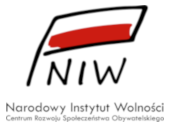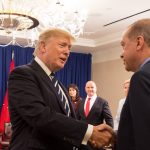SPECIAL REPORTS
Date: 8 October 2019 Author: Grzegorz Kuczyński
What’s Next For Turkey’s NATO Membership After S-400 Purchase?
Turkey has sealed a military deal with Russia, receiving the first parts of the Russian-made S-400 missile defense systems in the summer of 2019. Turkey’s President Recep Tayyip Erdogan did not bow to pressure from the United States, and Ankara’s determination to acquire Russian-built weaponry will enrage both Washington and its NATO peers.
- Turkey has sealed a military deal with Russia, receiving the first parts of the Russian-made S-400 missile defense systems in the summer of 2019. Turkey’s President Recep Tayyip Erdogan did not bow to pressure from the United States, and Ankara’s determination to acquire Russian-built weaponry will enrage both Washington and its NATO peers.
- Turkey’s purchase of the cutting-edge Russian military technology poses a thorny problem for all fellow NATO allies, a situation that presents a threat to the security of the entire Alliance. Turkey impairs NATO’s military deterrence of Russia,and NATO is soon seen to drastically reduce cooperation with Ankara.
- Turkey seeks to depict the current turmoil over its buying of the Russian S-400s in terms of a fissure in its bilateral ties with the United States, or a state of affairs that should not affect Ankara’s position in NATO structures. Brussels, for its part, is simultaneously making efforts to mitigate the crisis, remaining unwilling to exacerbate its ties with Ankara any further.
- The Turkish purchase of the S-400s prompts the question over Ankara’s intentions and its alliance with NATO. None of the parties is yet bound to break off the mutual engagement, seen by both as viable. Therefore Turkey’s acquisition of Russian military equipment, followed up by a deep political breakdown in U.S.-Turkish bilateral ties, cannot be the prelude to Ankara’s being kicked out of the bloc.
- Russia gains most from the Turkish-NATO deadlock amidst the S-400 supplies, albeit only tactically. Moscow is aware that a lasting alliance with Ankara is unlike to be forged – and opts for short-term solutions to weaken the North Atlantic Alliance. Turkey fails to view Russia as its alternative – military, commercial, or technological. Both countries’ interests in Syria and the Caucasus run contradictory one to another while in Moscow, there is a powerful group that lobbies against Turkey. If Turkey intends to keep its position of top regional power, it is doomed to work closely with the West, and not with Russia.
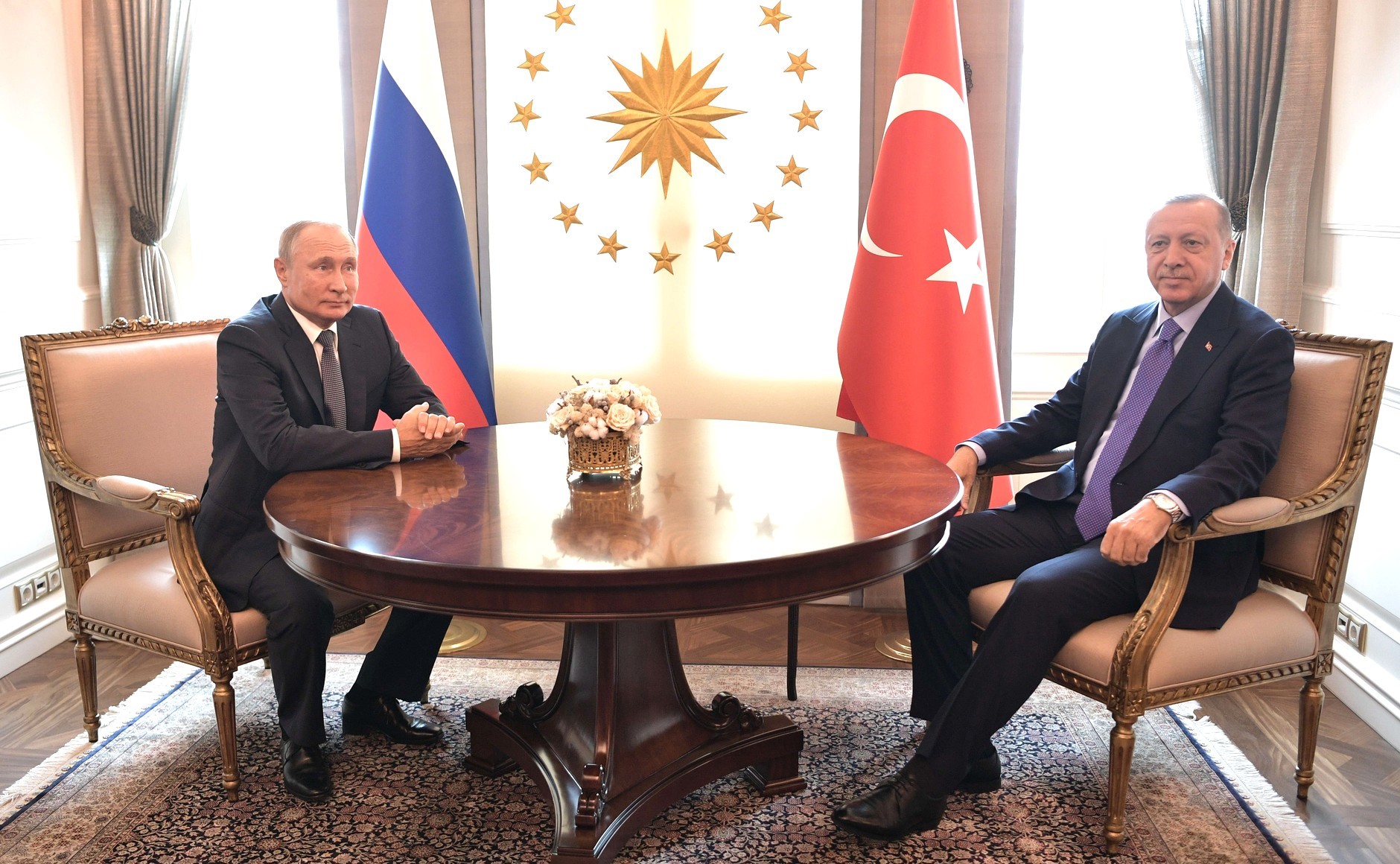 Russian and Turkish presidents during a meeting in Ankara, September 16, 2019. SOURCE: KREMLIN.RU
Russian and Turkish presidents during a meeting in Ankara, September 16, 2019. SOURCE: KREMLIN.RURussia and Turkey were first reported to hold talks on purchasing the S-400 air defense missile systems in November 2016. In September 2017, the two countries officially announced that the contract had been concluded. Under the deal, Turkey would get four S-400 batteries (regiments) worth a total of some $2.5 billion. Ankara took delivery of the very first parts of a Russian S-400 missile defense system on July 12. Turkey had inked a deal to buy Russian-made weaponry despite an outcry from its Western peers. The dispute over the S-400s is yet not a spark that led to a severe setback in Turkish-Western ties. Instead, this has culminated earlier tensions and anxieties running high in U.S.-Turkish relations for a couple of years since now, or, in a far broader perspective, also bedevilling Ankara in the eyes of the West.
Turkey’s fellow NATO allies argue that the Russian-made S-400 systems – once incorporated into the Turkish military stockpile – may make U.S. F-35 stealth fighter jets, with Ankara participating in their production process and holding interest in acquiring a batch of them, visible to Russian radars. The S-400 radar systems could be developed to detect F-35 jets, making them easily identifiable. It is enough for Russia to retain at least partial control of the S-400 regiments being delivered to Turkey. Formally, Turkey’s allies have spoken out against Ankara’s buying weaponry being incompatible with NATO military equipment. Ankara’s purchase of the S400s might narrow down the eagerness of its NATO peers to take part in any military drills staged on Turkish soil – with the use of the newly acquired anti-air defense systems – for fear of disclosing military secrets to Russia. Turkey has stated that it has no intention of incorporating its freshly bought S-400s into the NATO system. But this does not allay the public’s deep-seated fears over giving Russia insight into reports on the S-400’s ability to detect F-35 stealth fighter jets. Turkish Defense Minister Hulusi Akar said in May 2019 that other NATO countries had earlier entered into possession of Russian air defense systems. When saying so, he naturally meant Greece, a country that since 2007 has had the S-300s in its military stockpile, alongside other Russian-made military equipment.
When buying the S-400s from Russia, Turkey has been automatically subject to U.S. sanctions under CAATSA, which prohibits Washington’s military partners from concluding military deals with Moscow. A few U.S. congressmen released a statement calling for canceling the sale of the F-35 fighters and imposing sanctions on Turkish officials involved in signing the Russian-Turkish deal. The U.S. plan to launch the process of removing Turkey from its F-35 program is a foregone conclusion, though. But it will be up to Donald Trump to decide whether Washington will eventually trigger sanctions against Ankara. And the U.S. leader went silent about introducing punitive measures against Turkey for its recent deal with Russia under 2017 legislation designed to discourage countries from defense partnerships with Russia.
Let’s not forget that the turmoil amidst purchasing the S-400s is far from being a driver that sparked off a deadlock between Ankara and Washington. Instead, this is another stage of the crisis that largely stems from earlier breaches between these two. Back in 2003, Erdogan’s government in fact slapped its support for the United States in the Middle East. Quite the opposite; Ankara first gave the red light for employing its territory to stage an attack against Iran and is now at loggerheads with Washington over the Syrian Kurds while pursuing a confrontational policy towards Israel, Egypt, and Saudi Arabia. Added to this is its partnership with Russia and Iran within the Astana format and its support for a set of some Islamist groups, also in Syria. Other drivers that further fuel U.S.-Turkish strains are Erdogan’s domestic policy and his requests for the extradition of U.S.-based Islamic preacher Fethullah Gülen. This stems from the strategy for restructuring the country, adopted back in 2002 by Erdogan’s Justice and Development Party (AKP). Turkey is gradually sailing away from its Kemalist policies, more prone to make a tilt towards Islamic accents. It has ceased to serve as the vanguard in the Middle East and is now emerging a fully independent regional power.
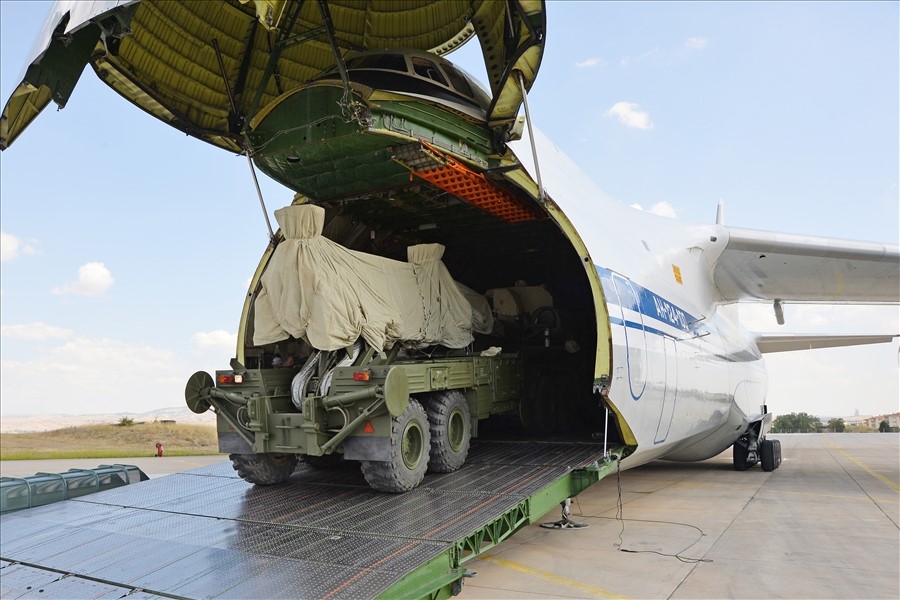
Neither Turkey’s misunderstandings with the United States – referred to as one of the top driving factors behind the former’s purchase of the Russian-built S-400 – nor the wave of the anti-U.S. moods that swept across Turkish society and was related to Erdogan’s policy should be underestimated. Taken the country’s economic struggles, the Turkish leader needs to listen to the people’s voice. Meanwhile, a poll conducted by Istambul’s Kadir Has University found that 81 percent of the respondents said the U.S. constitutes a threat to Turkey while Russia drew some 44 percent of all votes. Asked who they thought Turkey’s friends were, less than 5 percent of all respondents acknowledged these are the United States, the United Kingdom, and France. Not surprisingly, some 44 percent of people said Turkey should go ahead with the purchase of the Russian-built S-400 systems despite NATO’s objections and the U.S. planned sanctions, while only 25 percent said it should not.[1]Never before – since their joining the military bloc – had the Turks expressed such a strongly negative attitude to the Alliance.
Support Us
If content prepared by Warsaw Institute team is useful for you, please support our actions. Donations from private persons are necessary for the continuation of our mission.
Turkey in NATO
With its historically grounded hostility to Russia, Turkey surged as an impeccable U.S. ally after World War II. Turkey was the first country after the United States to answer the United Nations’ call for military aid to South Korea after having been attacked by its communist neighbor from the North. The first Turkish brigaded arrived in the Korean Peninsula in October 1950. Ankara sent four brigades of more than 20,000 soldiers, also in its utmost bid to join the North Atlantic Alliance. On February 18, 1952, Turkey had officially become a member of NATO. Ankara topped as a loyal and staunch ally of both the United States and NATO, helping safeguard the Alliance’s southeastern flank, or a strategically important bulwark. Had the Cold War not turned hot, a mighty Turkish army would have successfully bound the Soviets both in the Balkans and the Caucasus. The Americans gave the Turks nuclear guarantees in exchange for an alliance and promises of blocking the USSR from the south. With NATO’s second-largest military forces and close ties to Washington, Ankara served to obstruct Moscow’s expansion to the Middle East.
But earlier Turkey had suffered a major setback in its ties with NATO fellow allies, a sharp conflict that sparked off in response to the Turkish invasion of Cyprus in 1974. Nevertheless, Turkey’s “retreat” from NATO did not begin until the Islamist government, headed by then-Prime Minister Recep Tayyip Erdogan, came to power in November 2002. And another deadlock came soon after the 2003 invasion of Cyprus. Still then, the Turkish parliament, with newly elected Prime Minister Recep Tayyip Erdogan, failed to give permission for a U.S. Army division to invade Iraq via Turkey. In September 2010, fighter aircraft from Turkish and Chinese air forces conducted their first joint air exercises in Turkish airspace. Never before had any NATO member carried out joint military drills with China. In 2004, 53 percent of people spoke in favor of Turkey’s membership in the Alliance against no more than 37 percent seven years later. In 2012, Turkey was named a “dialogue partner” for the Shanghai Cooperation Organization (SCO), an alliance that consists of Russia, China, Kazakhstan, Kyrgyzstan, Tajikistan, and Uzbekistan. Beijing and Moscow remain at present committed to discussing Turkey’s full membership in the SCO.[2]
Ankara’s crackdown on other NATO nations has by no means been triggered by Erdogan’s authoritarian style or the ongoing Islamization of the country. Tensions escalated after the Syrian conflict broke out, with Turkey’s holding grudges against the bloc’s member states, accusing them of having left Ankara alone in the face of a mounting threat from Damascus. While saying so, Erdogan did not mean al-Assad or jihadists, but the Kurds whose YPG militia enjoyed U.S. support in the fight against the Islamic State. Also, Barack Obama’s shaky policy pertaining to the Syrian regime has taken its toll; back in time when Ankara had still overtly acted in favor of toppling the al-Assad regime, Obama, chiefly under Moscow’s influence, refused to apply forceful solutions to punish Damascus for using chemical weapons, thus contrary to what his administration had earlier announced.
In the wake of Turkey’s botched military coup attempt in 2016, U.S. Secretary of State John Kerry condemned the Turkish government for forceful repression of political opponents while warning that this undermined Ankara’s further NATO membership. Relations between Ankara and NATO’s headquarters in Brussels were severed by “a witch-hunt” against Turkey’s NATO military staff after the failed coup d’état. Among the victims of Turkey’s sweeping post-coup purge were chiefly military officers with links to peers in foreign allied armies, a move that undermined trust in the Turkish military and derailed unofficial communication channels.
Russia’s firm entrance to the Syrian conflict emerged as a turning point, initially leading to strains in its ties with Ankara that ran high after Turkey had shot down a Russian aircraft. Moscow’s response consisted in boosting military involvement in the region and waging the trade war with Turkey, back then in favor of toppling the government of Bashar al-Assad. Six months passed since that moment, marking a sharp tilt in Turkish-Russian relations and prompting these two to leave behind past resentments and take joint actions. Ankara seeks to foster both an economic aspect of this partnership, including Russian trade outlets, tourism, Russian-sourced gas and building a nuclear power plant, as well as a shared stance on Syria. Having no other choice while picking its partners in Syria’s war theater, Erdogan focused on bolstering cooperation with Moscow and Tehran under the Astana format. Ankara’s ties with Israel have dramatically deteriorated while those with the United States are getting worse and worse, given that the latter offers solid support to the Kurds, a useful ally in the war against the Islamic State in Syria. Also, Turkey has solidified cooperation with Qatar, a step that could hint nothing more but poorer relations with Saudi Arabia and the United Arab Emirates.
Turkey has long made efforts to acquire air defense missile systems; a few years later, the country had almost sealed the deal with China but had to resign amidst mounting pressure from Ankara’s Western allies. Having taken advantage of his ever-closer cooperation with Putin, Erdogan inked an agreement to purchase the S-400s from Russia. Turkey and Russia signed in late 2017 an accord to supply Ankara with surface-to-air missile batteries, worth a total of $2.5 billion. Since then, Washington had made several foiled attempts to dissuade Turkey from buying Russian-built military equipment, also by offering at the end of 2018 to sell air defense systems Patriot for $3.5 billion. And Donald Trump is right when blaming the previous presidential administration for what is taking place now, with both Barack Obama and the then Congress having impeded the delivery of Patriots missiles to Ankara. This, along with Turkey’s still-growing isolation in the West, played to the advantage of Moscow that cleverly ignited and co-created the conflict between Turkey on the one hand and the United States and NATO on the other.
Closer to Moscow
Ankara keeps enhancing ties with Russia proportionally to its deteriorating relations with the United States. Being high on the list of the main points of contention, the situation in Syria has since 2016 surged as a driver for rapprochement. Following the 2015 crisis when a Turkish jet downed a Russian Sukhoi Su-24 aircraft near its border with Syria, a thaw in the two countries’ bilateral ties occurred only six months later. Ankara has become Moscow’s partner in Syria, signed a batch of agreements that tightened these two’s economic alliance, and – to culminate these efforts – purchased the Russian-built S-400s. Erdogan plays up his rapprochement with Putin as a bargaining chip in the game against Washington. And this is an excellent opportunity for the Kremlin to impair NATO. Putin has a door open to weakening Russia’s top adversary, a longed-for occasion that a few years ago he could only dream of. Not only can Russia make $2.5 billion from selling its S-400s to Turkey, but it is also capable of striking a massive blow to the North Atlantic Alliance. The Kremlin’s long-term ambition is to narrow down the role that Turkey serves in NATO structures and to bolster the Ankara-Moscow army cooperation. Moscow would feel happiest if Turkey, infuriated with U.S. sanctions, both withdrew from the North Atlantic Alliance – analogically to Charles de Gaulle’s 1966 decision to pull France out of the bloc – and ordered to shut all U.S. military facilities on its soil. Notwithstanding that, Putin’s aspiration is not to see Turkey quit the Alliance, but he would prefer that Ankara remain in its structures, yet somewhat playing the role of Moscow’s “Trojan horse.” Downplaying Ankara’s role in NATO, not to even mention its plausible withdrawal from the bloc, strikes a blow both to the Alliance and the U.S.-orchestrated network of alliances and mutual dependencies in the Middle East, with Ankara as a critical piece of the puzzle.
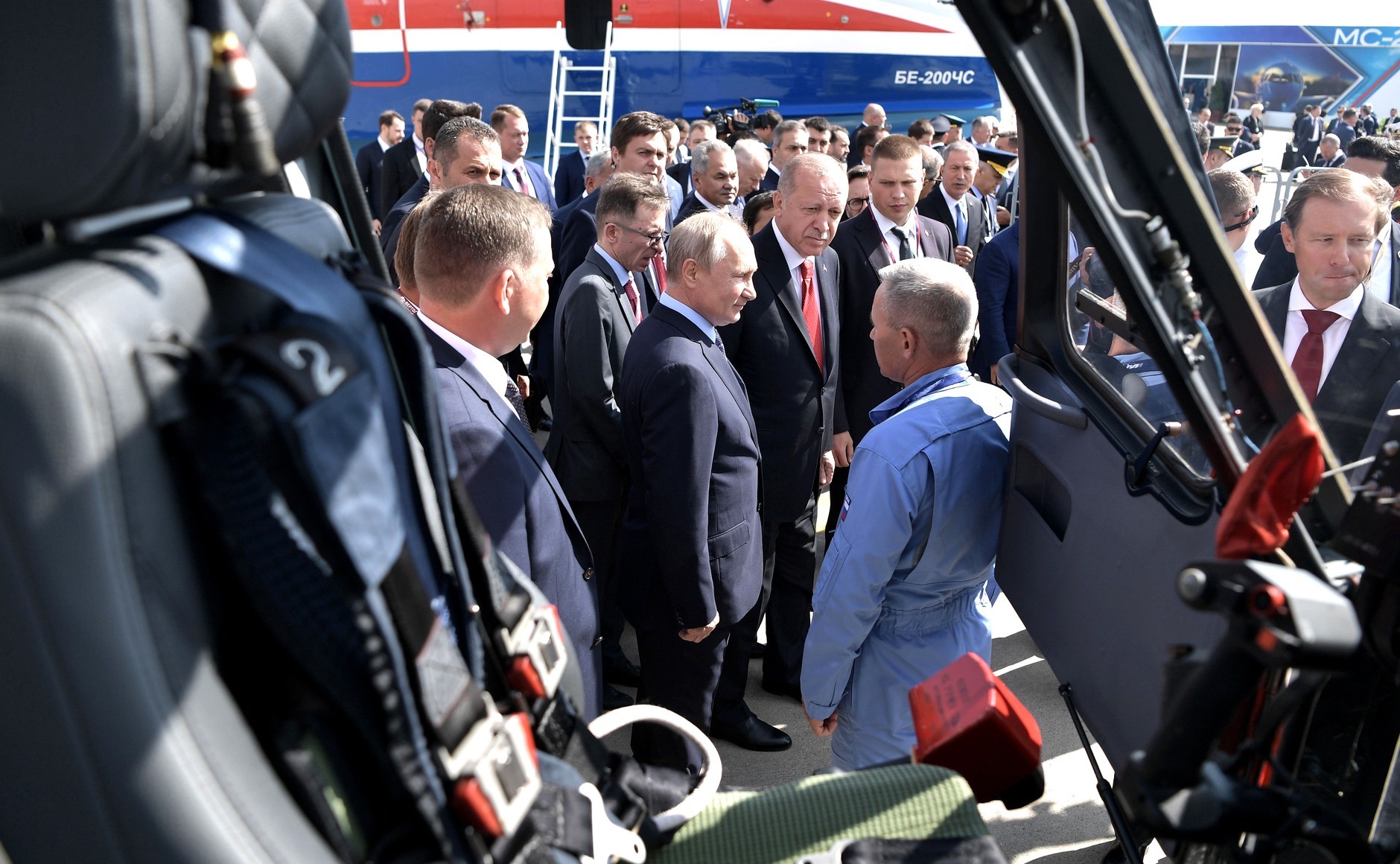
Russia is not an alternative to Turkey, though, and Ankara does not eye the Kremlin as a trustworthy ally. Erdogan is playing Russia as a bargaining chip in his countries’ relations with the West. Also for his part, Vladimir Putin seems aware that Russia’s long-lasting partnership with Turkey is unlikely so he is taking advantage of what is now taking place to derail NATO to the greater possible extent. Geopolitics condemns these two, Russia and Turkey, to rivalry, and not an alliance. Also, until the collapse of the Russian Empire, the Turks had fought against Russia 17 major wars, most of which lost by the former army. Anyway, Turkey’s 20th-century accession to NATO was dictated by Moscow’s expansion. According to retired Ambassador Selim Kuneralp, “Russia cannot replace the United States or NATO because Turkey and Russia have no shared strategic interests. They do not agree on an issue of vital national importance to Turkey, like Cyprus, or on many issues pertaining to the Balkans, the Caucasus or Syria,” he said. The former diplomat added that the past 300 years had been marked mostly by hostility between Turkey and Russia. Even today Armenia’s border is protected by Russian forces against Turkey. A factor that brings Putin and Erdogan close is their shared dislike (or hatred?) towards the United States and Europe.[3]
Speaking at a gathering in Washington to mark NATO’s 70th anniversary on April 4, 2019, U.S. Vice-President Mike Pence said that “Turkey must choose. Does it want to remain a critical partner in the most successful military alliance in history, or does it want to risk the security of that partnership by making such reckless decisions that undermine our alliance?”[4] Ankara’s determination to move ahead the S-400 deal made both Washington and the other allies in NATO question whether Turkey’s membership in the Alliance still makes sense. But will the kicking Turkey out of NATO structures offer benefits to all parties to the dispute?
Proponents of pulling Turkey out of the North Atlantic Alliance say that Ankara’s cooperation with Russia runs contradictory to NATO’s basic principles, making the country an adversary, and not an ally. Such voices tend to resonate strongly in U.S. neoconservative circles. But in stark contrast to them stand some milieus, mainly ultra-nationalist ones, that would welcome Turkey’s exit from NATO. They, in turn, believe that Ankara’s membership in the Alliance is not profitable for the former that fails to gain sufficient support from allies against their archest enemies. Those in Turkey that chide the bloc say that the United States and France both back the mainly-Kurdish People’s Protection Units (YPG) militia in northern Syria, seen by Ankara as a terrorist group holding links to the Kurdistan Workers’ Party (PKK). This stance is upheld by Devlet Bahceli, Erdogan’s unofficial coalition partner and the chairman of Turkey’s far-right Nationalist Movement Party, who publicly said in June 2019 that Turkey’s NATO alliance had reached a breaking point to be discussed soon. His flamboyant remark came in response to a letter sent by U.S. Defense Secretary Patrick Shanahan to his Turkish counterpart Hulusi Akar that laid out the consequences for Turkey’s acquision of the S-400 systems. In reply to that, Bahceli said Turkey should question its other international ties, with its NATO membership at the helm.[5]
When first shipments of S-400s arrived on Turkish soil on July 12, 2019, Turkish Defense Minister Hulusi Akar held a telephone conversation with Acting U.S. Defense Secretary Mark Esper. In a statement released following the talks, the Turkish Defense Ministry said there is no change in Ankara’s strategic orientation, adding that a deterioration in relations would not serve the interests of Turkey, the U.S. or NATO. Turkish President Recep Tayyip Erdogan said on May 6, 2019, that the decision made by the Turkish government to buy the Russian-built S-400 missile system is not tantamount to Ankara searching for alternatives worldwide. At an Ankara meeting with NATO Secretary General Jens Stoltenberg, Erdogan pledged his loyalty to the Alliance, adding that he expects NATO support Turkey’s rights in the eastern Mediterranean where the country makes efforts to pursue hydrocarbon resources in the waters off Cyprus’s exclusive economic zone. [6] Kicking Turkey out of NATO has neither political nor military sense, especially that little is know for how long Erdogan will remain in office or Ankara will uphold its current political course. The Alliance should show patience while Turkey has no business in cutting off its ties with NATO. So if not the Alliance, what ally may Ankara count on? Russia? Or China?
Profit and loss balance
The Alliance safeguards the security of both sides. Although here we are witnessing Turkey’s ever-tightening rapprochement with Russia, Ankara is aware – at least strategically – of its NATO membership as being a vital negotiating element. Outside NATO Turkey will be left far less secure, also when facing Russia. NATO membership guarantees Turkey’s security against its regional rivals, with none of them being eager to go to war with a member of the North Atlantic Alliance and a Washington ally. Leaving Turkey outside the military bloc is an entirely different thing. Erdogan’s country is neither independent in the area of security nor military (technologically) powerful enough to opt for strategic autonomy. Turkey’s being part of the Alliance guarantees cordial ties with its fellow NATO members, mainly Greece. Given that Ankara has long been embroiled in a dispute with Athens, Turkey needs to be aware that in the event of a potential war breaking out, NATO will mobilize to back Greece and not Turkey that stays outside the military bloc. Neither can Ankara afford to be pushed out of NATO’s nuclear umbrella, especially that one of its neighbors, Russia, has nuclear weapons in its stockpile while the other, Iran, could quickly get some in the future.
NEWSLETTER
For over the past sixty years, NATO has heavily invested in a relationship with Turkey, also helping expand its military infrastructure. A leading argument for NATO members in favor of keeping the friendliest possible relations with Turkey are the latter’s military facilities, with the superbly located Incirlik – some 150 kilometers off its border with Syria – as a top asset. The base is a crucial launching pad for U.S. aerial operations in Syria. The Kürecik military facility, in its turn, serves a pivotal role in protecting Europe and the United States against an Iran-orchestrated missile attack. Switching off its radar station would severely impair the functioning of the missile shield. In an interview with daily Cumhuriyet, retired General Ali Er pointed to the Kürecik radar facility as a critical element of NATO’s ballistic missile defense (BMD). If NATO were to withdraw from the Kürecik radar, Ankara could be left with no choice but to search for a matching radar system as it does not have the capability to produce this itself.[7] And if Turkey is cut out of NATO, the Alliance will no longer be able to influence the situation in strategic straits connecting the Black Sea to the Mediterranean. From NATO’s perspective, Turkey’s pullout of the bloc will strike a blow to its unity. And Ankara’s possible rapprochement with Moscow in the Black Sea and the Mediterranean Sea will be nothing more than a thorny problem. Being a representative of the Muslim world, Turkey somewhat entitles NATO to conduct missions across the region, as in Afghanistan or Libya. Turkish military personnel have been deployed to mostly Muslim Kosovo as part of a peacekeeping mission.
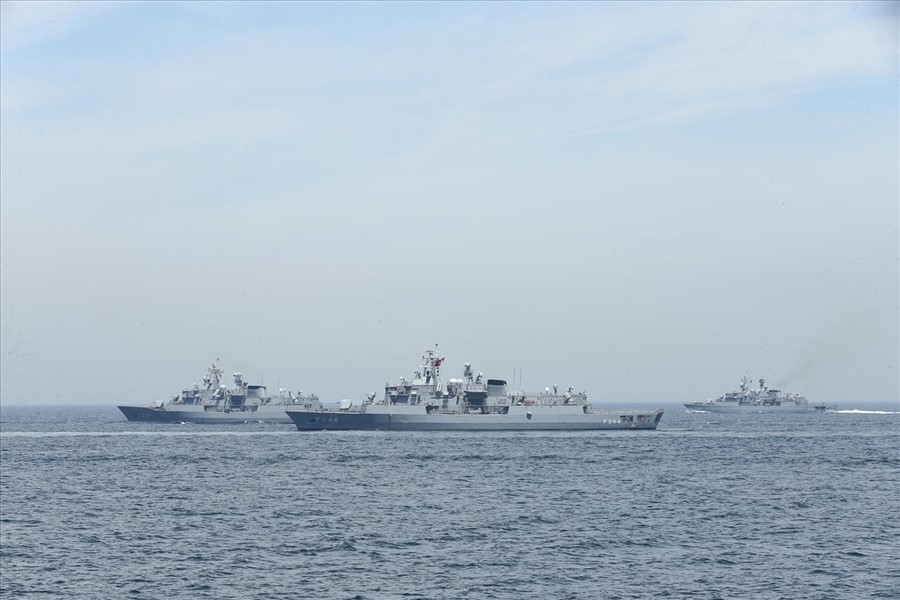
But Turkey bears no interest in leaving NATO structures, though as for the Kurdish issue, the United States and Turkey are now on opposite sides of the barricades. But this does not change the fact that Turkey and Russia were, are and will be geopolitical rivals. And what will happen in Syria, also in the rebel-held enclave of Idlib, will serve as a new turning point in the relations between Moscow and Ankara. For its part, the Turkish government has not broached the topic of quitting the bloc, and Brussels seeks to mitigate the conflict. In a visit to Ankara on May 6, 2019, Jens Stoltenberg thanked Turkey for its activities, citing its substantial contributions to NATO missions in Afghanistan and Kosovo. There seems no major plan in any NATO capitals to kick Turkey out of the Alliance, given its historical and geopolitical importance as a member. NATO Secretary-General Jens Stoltenberg said at a security conference that “Turkey, as a NATO member, is much more than just the S-400s.” [8] In the North Atlantic Treaty, nothing is said about expelling any NATO member from the bloc’s structures. The country in question ceases to be a member of NATO if it decides to do so. In short, no one really knows what mechanisms should be employed to withdraw Turkey from NATO structures. But even if Ankara fails to be expelled from NATO, or decides to remain within the bloc, it can still face some serious steps to be taken against it on the path for narrowing down its membership. Turkey could be kicked out of the Alliance’s crucial military programs.
But Erdogan is now seeking to purchase the S-400s, being conscious that the West will refrain from escalating tensions. The Turkish leader seems to be perfectly aware that kicking Turkey out of the bloc is an unlikely scenario. To carry out Western military operations in the Middle East, NATO is heavily reliant on Turkish involvement. Ankara will therefore try to weave between Moscow on one hand and Washington and Brussels on the other in an effort to strengthen its position and achieve goals. This will be a tough task for both sides to reach a compromise, especially after Ankara purchased Russian-made weapons, notwithstanding that, Turkey and its Western allies will undoubtedly hope to do so. Excluding from NATO a strategically located country with such a numerous army does not offer benefits to the Alliance and a similar solution is not at all sought by Turkey, left alone somewhere between Russia, Iran, and Syria. Though these are today referred to as tactical allies, who knows what they will become in the future? Ankara’s purchase of the S-400 missile system, followed up by a severe deterioration in relations between Turkey and the United States, and the former’s less dominant position in the Alliance, may in consequence bolster its position and offer greater independence in security matters, but, on the other hand, make Ankara reliant on both NATO and Russia.
Author:
Grzegorz Kuczyński – Director of Warsaw Institute Eurasia Program.
He graduated in history at the University of Bialystok and specialized Eastern studies at the University of Warsaw. He is an expert on eastern affairs. He worked as a journalist and analyst for many years. He is the author of many books and publications on the inside scoop of Russian politics.
[1] https://www.defence24.pl/rusza-dostawa-s-400-do-turcji-jakie-konsekwencje-analiza
[2] https://www.gatestoneinstitute.org/13882/turkey-putin-ally-nato
[3] https://www.al-monitor.com/pulse/originals/2019/04/turkey-russia-will-moscow-give-ankara-what-it-wants.html
[4] https://www.al-monitor.com/pulse/originals/2019/04/turkey-russia-ankara-anti-west-attitude-plays-into-hands.html
[5] https://www.al-monitor.com/pulse/originals/2019/06/turkey-usa-russia-how-s400-affair-affect-turkish-nato-ties.html
[6] Erdogan zapewnia o lojalności wobec NATO i szuka wsparcia Sojuszu, Polish Press Agency, 2019-05-06
[7] https://www.al-monitor.com/pulse/originals/2019/04/turkey-russia-will-moscow-give-ankara-what-it-wants.html
[8] https://foreignpolicy.com/2019/07/19/who-lost-turkey-middle-east-s-400-missile-deal-russia-syria-iraq-kurdish-united-states-nato-alliance-partners- allies-Adversaries /
The publication of the Special Report was co-financed from the funds of the Civic Initiatives Fund Program 2018.
The concept of analytical material was created thanks to co-financing from the Civil Society Organisations Development Programme 2019.
Selected activities of our institution are supported in cooperation with The National Freedom Institute – Centre for Civil Society Development.
All texts published by the Warsaw Institute Foundation may be disseminated on the condition that their origin is credited. Images may not be used without permission.



